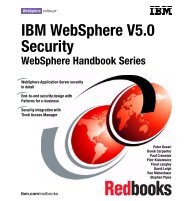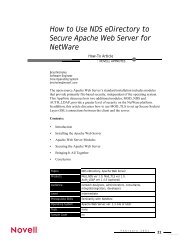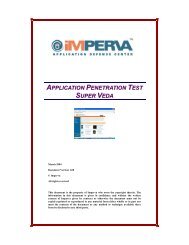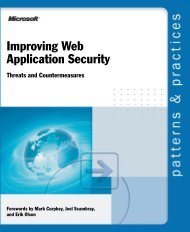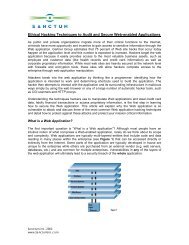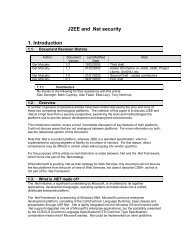Oracle 8i Security: New Features and Secure Solutions - CGISecurity
Oracle 8i Security: New Features and Secure Solutions - CGISecurity
Oracle 8i Security: New Features and Secure Solutions - CGISecurity
You also want an ePaper? Increase the reach of your titles
YUMPU automatically turns print PDFs into web optimized ePapers that Google loves.
The separation of users from schemas is truly the payoff for deploying a directory service. Thous<strong>and</strong>s of<br />
users can connect to a database, be known to the database (<strong>and</strong> audited in the database), with specific<br />
privileges in the database, without being created in the database. Now, you can truly create an<br />
enterprise user once, in the directory a single enterprise user account who nonetheless can access<br />
multiple databases, using only the privileges she needs to perform her job.<br />
Enterprise user management thus offers the following benefits:<br />
• Fewer User Accounts— Enterprise users no longer need to be database users nor have identified<br />
schemas.<br />
• Internet Scalability— You can support hundreds of thous<strong>and</strong>s of users, who are known to multiple<br />
databases, accountable (<strong>and</strong> audited in) multiple databases, without creating thous<strong>and</strong>s of<br />
database user accounts.<br />
• Easily-Enforced <strong>Security</strong>— If a user changes jobs or leaves, his privileges can be altered or<br />
removed, everywhere, merely by changing his user entry in <strong>Oracle</strong> Internet Directory.<br />
Organizations no longer need to worry about old, unused accounts or out-of-date privileges, which<br />
consume valuable system resources <strong>and</strong> are targets for hackers.<br />
• Reduced Cost of Ownership— Organizations save significant resources by managing a single<br />
enterprise user account <strong>and</strong> assigning enterprise roles once, instead of creating multiple user<br />
accounts with multiple passwords, each having multiple authorizations.<br />
PRODUCT SUMMARY<br />
With the continued growth of distributed systems, the problem of user authentication <strong>and</strong> user<br />
management is now acute. Users have too many passwords; consequently, they write them down or<br />
choose the same password for all accounts. Organizations must manage multiple accounts for each<br />
user. As a result, they devote significant resources to user administration, or invest in network<br />
authentication services, many of which promise single sign-on <strong>and</strong> centralized authorization<br />
management. Common information used by multiple applications— such as username, user’s office<br />
location <strong>and</strong> phone number— is often fragmented across the enterprise, leading to data that is redundant,<br />
inconsistent, <strong>and</strong> expensive to manage. The lack of centralization is a security risk since old or unused<br />
accounts <strong>and</strong> privileges can be misused.<br />
<strong>Oracle</strong> Advanced <strong>Security</strong> addresses the above needs for strong security, single sign-on <strong>and</strong> centralized<br />
user management by offering integrated security <strong>and</strong> directory services; specifically, by storing <strong>and</strong><br />
managing user information in a directory which supports the Lightweight Directory Access Protocol<br />
(LDAP). Multiple <strong>Oracle</strong> applications can rely on a common, centralized definition of a user to<br />
determine which applications, services, <strong>and</strong> databases a user may access, <strong>and</strong> with what privileges.<br />
The benefits of integrated security <strong>and</strong> directory services include:<br />
• Single sign-on to multiple <strong>Oracle</strong><strong>8i</strong> databases throughout the enterprise<br />
• Single enterprise user account, instead of multiple accounts per user<br />
• Reduced total cost of ownership through single station administration (SSA)<br />
• Well-integrated, st<strong>and</strong>ards-based public key infrastructure (PKI)<br />
• Stronger security through centralized authorization management <strong>and</strong> strong authentication.<br />
Page 7 Paper 269



